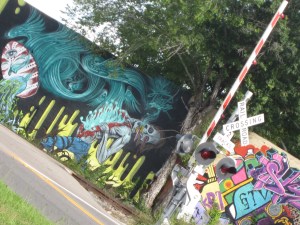by Tim Gilmore, 6/17/2012
Because if anybody asked him whether it were day or night, because if anybody asked him where he was, if anyone asked him in what part of town this couch on which he found himself might be, he would only be able to say, feedback loop.
How somebody got to this point, how somebody could drive away all his friends, how someone could so successfully have alienated himself—
He remembered walking down into a narrow brick-walled well behind the railroad tracks. An iron spiral staircase led down so deep into the ground that he had forgotten the smell of citrus blooms and car exhaust. And after he had descended for weeks?, months?, months and months strung into years?, he awoke to find himself on a hard couch in a dank room deep underground in his own last moment. He didn’t recognize his body or the way it had shriveled. He didn’t recognize the angles of these bones. He didn’t recognize the smell of his own rotting.
He remembered a friend telling him to get out of himself, saying he was stuck in a feedback loop. The songs he was writing now weren’t channeling the feelings inside that he needed to get out. They were creating new problems for him to consume and then to channel back out.
They went for a walk. Over the railroad tracks and back. King Street, Stockton, Rosselle. Friend offered to buy him a beer. “You could use some fattening, man. What’s going on with you? You’re all shriveled up.”
They walked down Rosselle Street to the taproom at Bold City Brewery, and the friend ordered two 1901 Red Ales. He only sipped it. His face showed nothing. He looked sucked-down into himself.
The friend said he would explain, he said, “See, we think art is therapy, right? And it can be. You have this need to write your songs and sing your songs, so whatever your issues are, those mommy-daddy things you don’t ever get worked out, you write that stuff, right? That song about nobody asking to be brought into the world and whose shoulders carry the burden of proof and that song where you just wail, ‘Save me’ over and over at the end. You still with me?”
His eyes moved toward the door. The taproom was dark. People laughed at a nearby table. Two people had walked through the door with empty gallon growlers to refill with Smokey Porter or Mad Manatee India Pale Ale.
The friend said, “So you write these songs and they work this kind of therapy. You release what you’d bottled up inside that you had no way to express. But that only works up to a point. You listening to me? ’Cuz I got a warning for you. So I hope you’re listening to me. See, that only works up to a point. Then something tips. You got it? Something tips and you’re not channeling that inner mess into beautifully damaged music anymore. Now, and this is crucial, man, this is crucial. After something tips, you’re regenerating that beautiful damage just for the music. You regenerate it, you recreate all that shit you purge out of your heart, you recreate it just for the music, and then what do you do? You swallow it back. You drink it down. You put it all right back in your heart, that place you were trying to get it out of. You’ve made this dangerous loop, this vicious circle. It’s a feedback loop. You put it back into your heart, then you’ve gotta rip it back out to put back in your art. But since that’s the kind of art you’re making, and it’s beautiful, and you become addicted to it, you have to create it all over again in more art and that puts it back into your heart. Pretty soon, your art and your heart, they’re both poisoning each other. And that’ll kill you. And by then you’ll think it’s worth dying for. I see that. I know what that is. And I’m seeing it in what’s happening to you. I know the beauty of suicide, but that’s a stupid beauty, man, cheap beauty. Then you’re just a rock n’ roll cliché, a Romantic poet cliché. And then the sad tragic beauty of your suicide, it’s just gonna bore people, man, and you won’t even know where you’ve gone, and you haven’t even touched that beer.”
He didn’t even know where he had gone. Somebody had said that to him once.
Now he was down underground in this apartment beneath the railroad tracks and he weighed 99 pounds on a 6’ 2” frame. Somebody in his head sang his poem. Mad torrents of inspiration once. He did not remember how he had come to be here.
His friend walked down the stretch of King Street from the St. Johns River to Riverside’s breweries, block after block of art galleries, restaurants, bars, tattoo parlors, dance studios. Past Green Street and Ernest Street, old warehouses built in the 1920s, 40s, and 50s straddled the railroad tracks. In a couple of these old warehouses were microbreweries and taprooms.
The friend walked into the blue-gray brick warehouse that housed Intuition Ale Works Taproom and Brewery. A chalkboard near the bar listed King Street Stout, Riverside Red, Willow Branch Wheat, and Shotgun Shack Black Rye. He sat down at the bar and had a Riverside Red. He read the description on the board and thought the beer names were landscape marker poems for the neighborhood. He though the description was a found-poem: “An aggressively hopped, high gravity red ale…Magnum hops for bittering and Simcoe hops for flavoring, aroma, and dry-hopping.” He thought about his friend nobody had seen for three weeks. He remembered when his friend was “aggressively hopped” and “high gravity.”
“I know where he went.” An amateur sometime jazz drummer sat down next to him at the bar.
“Where?”
“Into his own tomb. He walled himself up in there. He went down and down, around and around, until nobody could get to him.”
“I told him he was doing that, but I don’t think he could hear me anymore.”
For years, the friend and other friends and new friends walk up and down King Street that slices its axis up and down Riverside. Sometimes they play some kind of funky hippie jazz in a couple of bars. For years they meet up in the taprooms and drink Mad Manatee at Bold City and Shotgun Shack Black Rye at Intuition. A beer garden goes in and out of business. This gay bar and that gay bar. King Street is a living river, but Riverside itself is a bigger animal, its own octopus of
an organic town inside a larger uncitied city. Riverside’s its own life bigger than their lives, comprising their lives and their life, and it doesn’t mind making ghosts of them or bringing back their ghosts at intervals. Their ghosts become patterns, patterns of light and dark like shadows of leaves thrown by sunlight through windows onto very old hardwood floors. Full of everything they ever felt, their shadows come and go on King Street and Rosselle and Green and Cherry, at an obtuse angle in a doorway, in a glance through a window, in a crowd in the wane of sunlight beneath a magnolia tree, in ideas that recur every so many years at the crossroads of this street and that street.
In the warehouses of the breweries, the yeast strains are reused from one batch in a 10-barrel tank or a 20 or 30-BBL tank to the next batch to the next. The same genealogy of living thing as one long entity, generations and generations, disappeared friends and yeast strains, shadows and patterns in the culture.

















